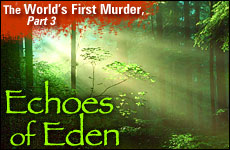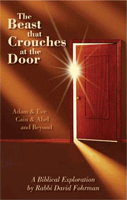 Iran’s Attack on Israel
Iran’s Attack on Israel


4 min read
3 min read
7 min read
11 min read
The connection between the story of Cain and Abel and the story of Adam and Eve is not easily deduced, but very relevant.
The story of Cain and Abel seems like a tale that could have happened at any point in history:
One day, two brothers bring offerings to God. God favors one over the other, and the spurned brother murders the favored one.
For most of us, that's all we need to know. Two brothers become rivals, and the rivalry ends in murder. It hardly seems to matter where in the Bible this story appears. It seems a mere point of trivia that Cain and Abel were the children of Eve; that this story immediately follows the Tree of Knowledge narrative; that not so long ago, Adam and Eve ate from the Forbidden Fruit and were exiled from Eden. Yes, all that is true -- but it all seems incidental. When we read of Cain and Abel, we envision a blank slate, a new chapter in the history of mankind.
But slates are rarely as blank as they seem.
I am going to argue to you that the story of Cain and Abel bears the unmistakable imprint of the story that immediately precedes it, the Tree of Knowledge saga. The Biblical text, in a number of subtle and not so subtle ways, seems to go out of its way to connect these two very different stories. We can wonder why the Torah does this, what it is trying to tell us. We can debate that. But the fact of the connection is, I think, not debatable. For some reason, the story of Cain and Abel is suffused with the memories of Eden. That's just the way it is.
You don't have to take my word for any of this. You can see it for yourself.
Re-read the story of Cain and Abel. But don't just read it in a vacuum. Read it side by side with the story of Adam and Eve in the Garden. At face value, the stories couldn't seem more different. One deals with talking snakes and Forbidden Fruit; the other with a spurned offering and an act of murder. But look a little more closely. Hidden in the verses of Cain and Abel you will find a curious abundance of parallels to the story of the Forbidden Fruit. Certain key phrases, ideas or events appear in one story, then unexpectedly, re-appear in the next one. See if you can find them.
I hope you've taken a few moments to look over both stories. In any case, you've had your chance; I've closed my eyes and counted to ten and ready or not, here I come. I'll tell you what I came up with, and you can tell me if it matches your list.
In the first few verses of the story, nothing obvious reminds us of Adam and Eve in the Garden. But don't get discouraged; keep reading...
A "Missing Persons" Alert
Immediately after Cain kills his brother, God addresses Cain with a question:
And God said to Cain: "Where is Abel, your brother?" (Genesis 4:9)
One second. That part seems familiar, doesn't it? In the Eden story, there was a question like that, too -- no? After Adam commits his great misdeed -- after he eats from the Forbidden Fruit -- God addresses him with a question as well:
G-d called out to Adam and said to him: "Where are you?" (Genesis 3:9)
In each story God quests after a "missing person." And the quest itself is of a very particular kind.
In each story God quests after a "missing person." And the quest itself is of a very particular kind. It takes the form of the question "ayeh" -- where is he? There are two Hebrew words for "where." The more common one is eiphoh; the less common is ayeh. In each of these two stories, it is the less common, ayeh form of "why" which God asks.
What's the difference between eiphoh and ayeh? Eiphoh seems to be a more generic "where," a basic request for location. Ayeh, on the other hand, is used when the questioner is less interested in where something is than in why it is not here, where it ought to be. In Eden it is the ayeh question that is asked: Not where is Adam, but where has Adam gone? What happened to him? And so too in the story of Cain and Abel the ayeh question is asked: Not where is Abel, but where has Abel gone? What happened to him?
Hide and Seek
Let's go on. How do Adam and Cain respond to the ayeh question from the Almighty?
Adam, overcome with the consequences of his deed, aware of his newfound vulnerability, states that he has been hiding from God:
I heard your voice in the garden and was afraid because I was naked and I hid. (Genesis 3:10)
At first glance we don't find anything comparable in the Cain story. We do not find Cain trying to hide behind any bushes, nor does Cain complain about being naked. But listen carefully to the following two verses, and see if you can't discern in them the echo of Adam's words:
And Cain said to God, "My sin is greater than I can bear. Here you have cast me away today from upon the face of the earth and from your face I will hide; I will be a wanderer in the land, and everyone that finds me will kill me." (Genesis 4:13-14)
Just as Adam speaks of hiding from God, so does Cain: Tucked into Cain's response to God is a curious premonition that he is destined to spend his life hiding from the Almighty, "...and from your face I will hide."
Adam hides in the past tense: At a particular point in time, he hides from God and then explains to the Almighty that he has done so. Cain hides in the future tense. Having been banished to a life of exile, Cain intuits that he will spend his days in a continual state of isolation from his Maker.
No Place Like Home
Besides Cain's premonition that he will hide from God, there are other reminders of Eden in the consequences that befall Cain after he kills his brother.
After having eaten from the Forbidden Fruit, Adam is told that he and Eve must leave Eden, never to return. They are exiled from the only home they know.
But Cain, too, must leave home, "...a wanderer shall you be throughout the land" (Genesis 4:12).
Adam and Eve, in the wake of their sin, are forced to leave Eden and make a home for themselves elsewhere. Cain, in the aftermath of his sin, cannot find a home anywhere.
To Be Cursed From the Ground
In addition to perpetual exile, the Almighty imposes one more curse upon Cain. Henceforth, Cain's efforts at farming will meet with frustration.
And now: Cursed are you from the ground that has opened its mouth to take your brothers blood from your hand. When you work the land, it will not continue to give its strength to you. (Genesis 4:11-12)
Once again we seem to be transported back to the Eden story. It is not just Cain who experienced difficulty farming at the behest of the Almighty. Adam too, in the aftermath of eating from the Tree of Knowledge, had found himself hearing very similar words from God:
Cursed is the land on your account; in toil will you eat form it all the days of your life. Thorns and thistles will it grow for you, and you will eat the grass of the field. By the sweat of your brow will you eat bread. (Genesis 3:17-19)
Adam is told that he must wrest his sustenance from the ground; Cain is told that although he works the land, it will no longer give its strength to him.
So now let's add it all up.
Clearly the Cain story is filled with the imagery, language and ideas that animate Adam and Eve's banishment from the Garden.
Clearly the Cain story is filled with the imagery, language and ideas that animate Adam and Eve's banishment from the Garden. Somehow, Adam and Eve's experience in Eden is gone but not forgotten. Somehow, the silent presence -- or absence of -- the Garden continues to dominate and define the lives of those who have long since left its confines.
The mystery behind these connections goes a little deeper though, for there is more to these connections than immediately meets the eye.
A Growing Intensity
A pattern seems to weave itself into these four connections. The elements are not simply repeated from story to story; rather, each element expresses itself a little differently when it reappears a second time. There is a pattern to these differences. Can you find it?
In each of these four examples, the response to Cain's wrongdoing seems to be a more intense version of Adam's experience. Whatever happened in the wake of Adam & Eve's eating from the Forbidden Fruit, happens again after Cain murders Abel -- but when it happens a second time, it happens with greater force and impact. Each of these connecting elements intensify in the story of Cain.
What is the Bible telling us here?
A Tentative Theory
At the very least, it seems that these stories are connected. But the fact that the consequences intensify from story to story suggests more, I think, than some sort of mere casual connection between the narratives. It suggests that there is a progression going on. It suggests that failure in Eden sets the stage for Cain and Abel. It is as if you could place the two stories -- Adam and Eve in the Garden, and Cain and Abel -- on successive steps of a ladder. When you face the challenge of the Garden and fail that sets up a new challenge -- a challenge that is a "next" step on the same ladder. The consequences for failure in the second challenge are rightfully the same as they were at the earlier level, only that they are felt more intensely.
All of this, of course, is easy to say -- but what does it mean in real life? Why would a story about eating from the Tree of Knowledge of Good and Evil set up a story about sibling rivalry, spurned sacrifices and murder? If the Cain and Abel story is about offering the wrong thing to the Almighty; if it is about the inability of two brothers to get along; if it is about the terrible fruits of jealousy -- what does this have to do with the choice to eat from a mysterious tree that Go put off-limits? How really, are the challenges faced in one story in any way similar to the challenges faced in the other?
Somehow, the questions which Cain faces -- what kind of offering to bring to God; whether to invite Abel for a menacing stroll in the field -- are born somehow of Adam's decision to eat the Forbidden Fruit. Our challenge will be to figure out how this is so.
 This series is excerpted from Rabbi Fohrman's new book, "The Beast that Crouches at the Door: Adam and Eve, Cain and Abel, and Beyond." To purchase a copy visit www.jewishtextstudy.org or visit www.amazon.com
This series is excerpted from Rabbi Fohrman's new book, "The Beast that Crouches at the Door: Adam and Eve, Cain and Abel, and Beyond." To purchase a copy visit www.jewishtextstudy.org or visit www.amazon.com
